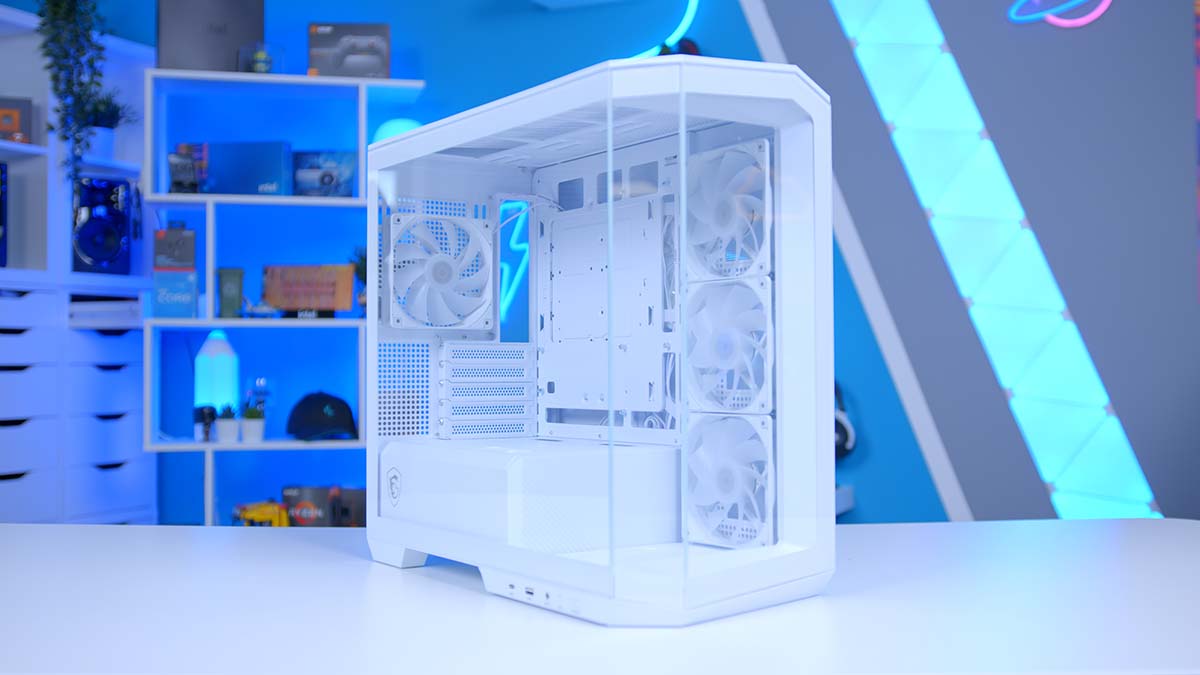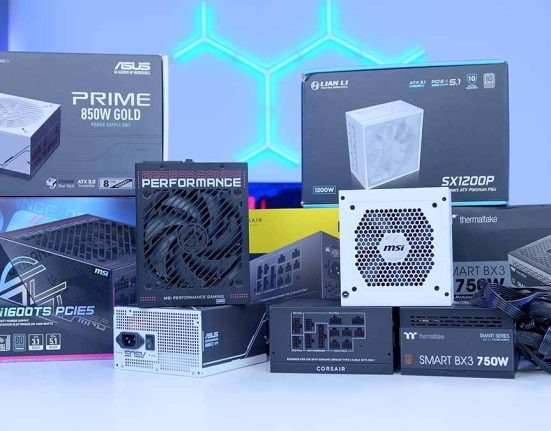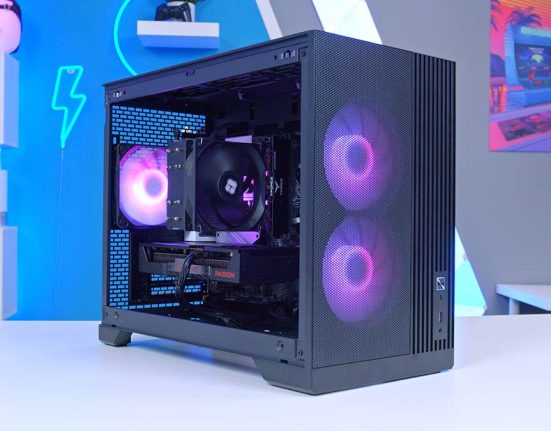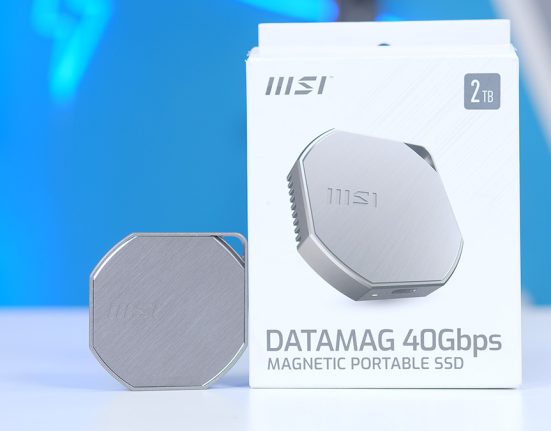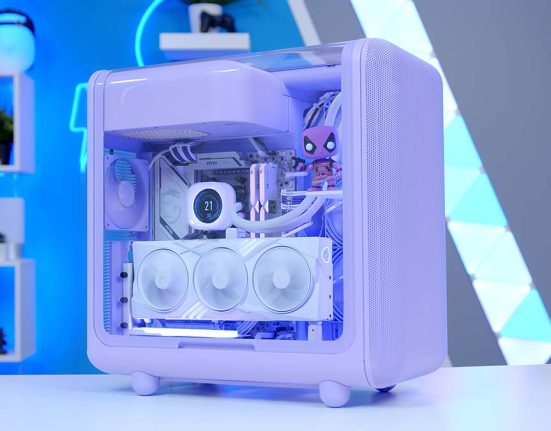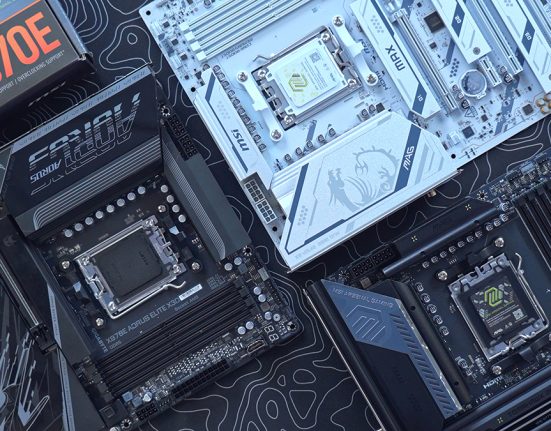Introduction
MSI’s PROJECT ZERO is a campaign designed to stop cables from obstructing the components within your PC build, whilst also reducing the hassle of cable management. By moving the connectors to the back of the motherboards, cables can easily be hidden and stored safely, leading to a clean-looking gaming PC.
But how can PC gamers implement PROJECT ZERO into their next build? Introducing the MSI MAG PANO M100R PZ, a PC case that aims to elevate the overall look of your setup, whilst also playing a key role in MSI’s PROJECT ZERO technology.
In this review, we’ll be taking a closer look at this chassis, to see how it differentiates itself from other PC cases on the market. Additionally, we’ll be considering how the MSI MAG PANO M100R PZ supports PROJECT ZERO, as well as whether this technology is worth considering for those hoping to build a particularly sleek and refined build in the future.
Buy the MSI MAG PANO M100R PZ on:
Specifications
After an initial glance over the specs for MSI’s latest chassis, there are a number of areas that peaked my interest – for good and for bad. For example, it’s quite the surprise to see a larger case only include support for micro-ATX motherboards, when other key metrics like clearance for graphics cards and CPU coolers seem to be more than ample, and fan mounting support substantial.
The most obvious explanation for this limited motherboard support is because of the way that ‘cable free’ motherboards, like those that sit under the MSI PROJECT ZERO branding, are designed. The movement of the cables to the rear requires a set of cutouts on the motherboard tray within the case. This means that cutouts need to align perfectly with the motherboard connectors – something which certainly differ between smaller Micro-ATX and full size ATX motherboard designs.
Nevertheless, to see such a large case be based around the Micro-ATX form factor is still a little odd – and something which is likely to sacrifice features and connectivity on the range of motherboards available.
| Specifications | MSI MAG PANO M100R PZ |
|---|---|
| Form Factor | Mid-Tower |
| Motherboard Support | Micro-ATX, Mini-ITX |
| Case Dimensions (H x L x W) | 405mm x 440mm x 235mm |
| Front IO | 1 x USB 3.0 1 x USB 3.1 Type-C 1 x 3.5mm Combo Jack |
| PCI-E Slots | 5 |
| Colour | White or Black |
| Max Clearance | 175mm Cooler Height 390mm GPU Length 200mm PSU Length |
| Drive Support | Up to 2 x 2.5 inch Up to 1 x 3.5 inch |
| Fan Support | Side: 3 x 120mm Top: 3 x 120mm Front: N/A Rear: 1 x 120mm PSU Shroud: 2 x 120mm Bottom: 1 x 120mm |
| Radiator Support | Side: N/A Top: 360mm Front: N/A Rear: 140mm |
| Pre-Installed Fans | 4 x 120mm |
| MSRP | $109.99 |
MSI MAG PANO M100R PZ Design
For those familiar with the emergence of PC cases with panoramic glass panels, the look of MSI’s MAG PANO M100R PZ will feel very familiar. A wrap-around glass front panel, with an angular feel is nothing new, and something we are starting to see become widespread in the PC case market.
However, delve deeper and you begin to unravel the secrets of this design. Whilst the ‘fish-tank’ aesthetic is clearly one of the main selling points of the PANO M100R PZ, it’s innovative installation methods are what distinguishes it from other designs with a similar approach. By removing the panels, you gain remarkably easy installation to parts like the motherboard, helping to further simplify the build process
Due to the wrap-around glass panel occupying the font and side of the case, fans and radiators need to be side mounted, leading to the supporting fans or CPU cooler being presented in a way that is more pleasing to the eye than conventional PC case layouts. As a result, this case will be an excellent centrepiece for any gaming setup.

However, the main reason to pick up this chassis over the plethora of similar designs to have flooded the market is for the compatibility with back-connect motherboards. At the time of the PANO M100R PZ’s release, these boards are a new concept that move the connectors to the back, leading to a cleaner-looking interior for PC builds, along with less cable management.
For MSI, this case plays a key role in their PROJECT ZERO campaign, as it is tailor-made to support their PROJECT ZERO motherboards. Because of this, there are a few design choices on this PC case that are less conventional, such as the elevated PSU shroud and openings surrounding the motherboard for the inverted connectors.


MSI MAG PANO M100R PZ Building Experience
With one of the main objectives of MSI’s PROJECT ZERO being to simplify the PC building process, we were very interested to see whether the back-connect design would have an impact. To find out, we paired the MSI MAG PANO M100R PZ with MSI’s B650M PROJECT ZERO motherboard to create an all-white gaming PC.
Overall, moving the connectors to the rear of the motherboard certainly had the benefits that PROJECT ZERO suggests. Not only does the lack of cables within the PANO M100R PZ’s main chamber lead to a clean-looking build, the easy access to the connectors makes it easy plug in the necessary cables.
That being said, these changes have also brought some complications at other stages of the build, mainly when putting the motherboard into place. With so many exposed pins that could be damaged, builders will have to take a lot of care when placing their motherboard into the chassis. On top of this, we experienced some clearance issues when plugging connectors into the back of the motherboard.
Thankfully, MSI have listened to the feedback on this and are making the appropriate changes to reduce this issue. However, these problems are signs of the growing pains that early adopters of this technology will have to endure.
MSI MAG PANO M100R PZ Thermals
With any case that relies on a tempered glass panel for aesthetic purposes, there are always concerns over thermal regulation. However, the PANO M100R PZ includes plenty of ventilation to help combat higher temperatures. For example, the back panel includes perforated sections on either side, allowing air to move in or out of the main chamber with ease.

Along with the case being packaged with four pre-installed fans as standard, there is space for additional fans along the bottom and top of the main chamber, making it easy to maximise airflow. As for the radiator, the PANO M100R PZ can support up to 360mm, which means builders can take advantage of a high-end liquid CPU cooler. However, this radiator can only be housed at the top of the chassis, limiting a user’s ability the dictate the direction of airflow.
Features We Like
270-Degree Glass Panel
There’s a good reason why we keep seeing manufacturers implement glass panels that wrap around the front and side of PC case, as it simply makes a PC build look amazing. The MSI MAG PANO M100R PZ is no exception, as the 270-degree glass panel lets PC builders see the parts in all their glory. Also, the side mountings for the fans across the back of the chamber help to emphasise the presentational aspect of this case. When you consider this case is designed with the PROJECT ZERO motherboards in mind, it makes a lot of sense as to why MSI have decided to use this layout, as it allows anyone building in this chassis to show off the tidiness of their gaming PC.

Back-connect Assembly
Speaking of the PROJECT ZERO infrastructure, the MSI MAG PANO M100R PZ is a vital element of the campaign, as it proves how valuable the innovative design can be when building a PC. As one of the few cases currently able to support back-connect motherboards such as MSI’s very own B650M PROJECT ZERO, this case has a major advantage over other designs when it comes to easy installation and cable management. Whilst the PANO M100R PZ has to sacrifice a lot of practicality elsewhere to support this, the ability to easily plug in connectors without obstruction, as well as avoid clogging up the main chamber with messy wires, makes the trade-off a lot more understandable.

PSU Shroud Fan Support
For every disadvantage of this chassis, there seems to be an advantage to counteract it. A prime example of this comes with the fan support on top of the PSU shroud, which is only possible due to the restricted motherboard support. Along with the two additional fans slots enhancing the cooling capabilities of this case, the location of the elevated platform is ideal for the graphics card. This is because the attached fans sit underneath the GPU slot, making it easier to push hot air away from the card.

Features We Don’t Like
Radiator Support
Though the amount of fan slots within this design will help to alleviate some of the temperature concerns caused by the wraparound glass panel, this chassis surprisingly lacks a similar level of support for radiators. Whilst it is possible to attach a 360mm CPU cooler, which is more than enough to keep flagship processors cool, the placement for the cooler is restricted to the top and rear panels. What makes this particularly strange is that most ‘fish-tank’ PC cases prioritise side-mounted radiators, as this provides builders with the best way of displaying their CPU cooler.

Motherboard Restrictions
By far the biggest disappointment of this case is the lack of support for ATX and E-ATX motherboards. It might be understandable given the focus on the PROJECT ZERO format, but restricting gamers to either a Micro-ATX or Mini-ITX motherboard results in an immediate lack of interest from a large chunk of the general target audience. As the majority of other ‘fish-tank’ PC cases will support at least ATX designs, it is hard to see why anyone not invested in the idea of PROJECT ZERO would choose to put up with the restrictions of this chassis.

Alternatives
If you like the appearance and design of the PANO M100R PZ, but aren’t quite convinced by the PROJECT ZERO initiative, you might want to consider these alternatives. Both of the recommended cases take advantage of a wraparound glass panel, with a more traditional dual-chamber layout.
HYTE Y60

Despite lots of brands looking to overshadow it, the HYTE Y60 is still amongst the best PC cases, especially when it comes to aesthetics. Arguably acting as the catalyst for the ‘fish-tank’ craze within the gaming landscape, the Y60 is a strong alternative to the PANO M100R PZ for gamers that aren’t interested in taking advantage of MSI’s PROJECT ZERO technology within their PC build.
Buy the HYTE Y60 on:
Montech King 95 Pro

To put it simply, the Montech King 95 Pro is one of the best PC cases we’ve ever tested. This chassis possesses incredible build-quality, along with a curved glass panel for an uninterrupted look at the internals of your build, all for an affordable price point. If you’re simply looking for the best value for money chassis for your build, it’s hard to overlook the King 95 Pro.
Buy the Montech King 95 Pro on:
Conclusion
MSI MAG PANO M100R PZ
Product Name: MAG PANO M100R PZ
Brand: MSI
-
Features
-
Design
-
Versatility
-
Value For Money
Summary
As a companion for the MSI Project Zero motherboards, this is clearly the best choice on the market, as it is tailor-made for this technology. Combined with the MSI’s innovative micro-ATX motherboards, the MAG PANO M100R PZ is an innovative chassis that results in a clean-looking build and less hassle when it comes to cable management.
Unfortunately, the heavy focus on Project Zero implementation causes this case to make a number of sacrifices which make it less than ideal for the average consumer. For example, the absence of ATX motherboard compatibility, as well as restricted radiator installation options prevents the PANO M100R PZ from offering the versatility available on competitor designs. On top of this, the overall aesthetic feels to close to the other ‘fish-tank’ designs on the market to leave a lasting impact.
So unless you plan on building a PC using MSI’s Project Zero motherboard, there is most likely a better option to suit your needs than the MSI MAG PANO M100R PZ.
Pros
✅ Clean aesthetic
✅ Fan support
✅ Cable management
Cons
❌ Motherboard support
❌ Radiator placement
❌ Better options available


